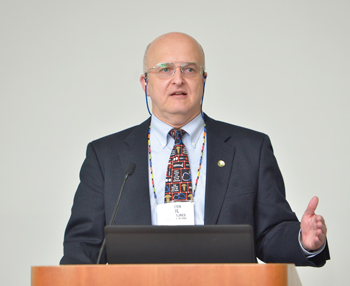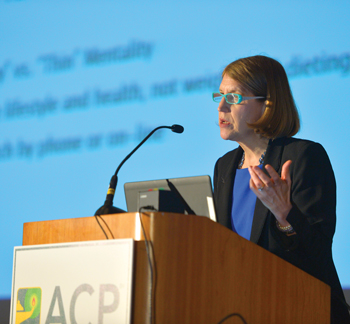Questions, answers on certification
A session outlined how a new Maintenance of Certification process will work. Starting in 2018, eligible physicians certified in internal medicine will be offered the choice of taking an assessment every two years or every 10 years.
Internists have questions about the upcoming changes to the Maintenance of Certification (MOC) process, and detailed answers came forth at Internal Medicine Meeting 2017. In short, attendees heard, changes will continue until the system works.
The American Board of Internal Medicine (ABIM) released new information about upcoming changes to its MOC program on March 29. A few days later, at the panel session “Moving Forward with a Community-Redesigned MOC,” panelist Yul D. Ejnes, MD, MACP, offered attendees a more detailed look.

“It's evolving, and I have to emphasize that,” said Dr. Ejnes, a member of ABIM's board of directors and a member of the Internal Medicine Board. “We're going to do things, we're going to change things, we're going to look at them, and if things don't work, we're going to change them until they work.”
He reminded attendees that ABIM will offer a two-year assessment option to physicians certified in internal medicine and nephrology in 2018. The option is intended to offer more choice, relevance, and convenience to physicians maintaining board certification, Dr. Ejnes said. The 10-year exam will remain an option, but both the 10-year and two-year exams will have an open-book feature for internal medicine and nephrology beginning in 2018.
“Open book” means that physicians will have access to a to-be-determined online reference source while they are taking the examination, explained Dr. Ejnes, who is a past Chair of ACP's Board of Regents. The two-year option is scheduled to be rolled out to all subspecialties by 2020, Dr. Ejnes said (one exception: adult congenital heart disease, whose first MOC assessments, both 10-year and two-year, are scheduled to be offered in 2023).
While ABIM originally considered two-year and five-year testing options, it decided to move to a two-year model based on results from surveys, focus groups, and community engagement, as well as recommendations and analysis from ABIM staff subject-matter experts, Dr. Ejnes said. The shorter, lower-stakes assessment every two years was considered the option with the most flexibility to focus future assessments on a subset of knowledge relevant to practice, allowing some but not all subspecialities to be covered in certain cycles, he noted.
“We're currently calling [the two-year assessment] the Knowledge Check-In,” Dr. Ejnes said. Starting in 2018, eligible physicians certified in internal medicine will be offered the choice of taking an assessment every two years or every 10 years. The two-year option, in addition to being shorter, can be taken at home, in the office, or “if you really want to do your hand print,” in the testing center, he said.
In addition, the two-year exam will offer more continuous learning, feedback, and opportunities for improvement, “because the way we'll do feedback is going to change,” Dr. Ejnes said. Specifically, he said, physicians will know right away whether they successfully passed the assessment rather than waiting months for the results. More detailed feedback will follow that will help physicians identify potential areas of weakness and offer links to resources to help shore these areas up, he said.
As in the current MOC program, physicians will need to pass an assessment before the end of 10 years, but they don't need to pass every Knowledge Check-In that they take, Dr. Ejnes said. The two-year Knowledge Check-In will be “no consequence” in 2018, that is, those who don't pass the two-year assessment in 2018 won't see a negative impact on certification or MOC participation status. Dr. Ejnes noted that this will allow people to try out the two-year exam as well as let ABIM learn from what happens and make any necessary adjustments for future administrations.
However, Dr. Ejnes stressed that “no consequence” doesn't mean the assessment can be skipped. He said that physicians who are due to take an assessment by 2018 need to either take the 10-year exam or try the Knowledge Check-In. Those who try the Knowledge Check-In and pass don't need to reassess until 2020. For those who try the Knowledge Check-In and don't pass, however, the attempt won't count against them, and they can do the Knowledge Check-In again in 2020, Dr. Ejnes said.
Dr. Ejnes assured attendees that even after 2018, certification can't be lost because of a single unsuccessful performance on a two-year assessment. However, physicians who are unsuccessful at two consecutive attempts on the two-year exam will need to take the 10-year exam to maintain certification, he said.
He also offered additional details regarding timing. In general, he said, physicians will need to either take the two-year exam or pass the 10-year exam within 10 years of their last pass date. “The best way to know where you stand is to go to your MOC Status page on the ABIM web site,” he said, where assessment due dates are given for each certification earned. Physicians don't need to choose which assessment to take, two-year or 10-year, until the year it's due, he said.
Of note, physicians whose certificates expire before the two-year assessment is available will still need to take and pass the existing 10-year exam to maintain certification. Dr. Ejnes said that he can sympathize with this group because he was part of it: He needed to recertify before the end of 2017 and so took the 10-year examination last year.
“You will need to do that. You cannot wait until 2018,” he said. “That's very important because if you let your certification lapse, then you can't enter the two-year assessment pathway. The prerequisite is you need to be in good standing with your certification.” He noted that those who pass the 10-year exam before the two-year assessment is available will not have to reassess for another 10 years.
Future improvements planned by ABIM include making the two-year assessments open-book in all of the subspecialities and focusing them on subsets of “the internal medicine songbook, as I call it,” Dr. Ejnes said. He noted that ABIM is also working with some of the subspecialty societies to create additional assessment options.
“What isn't going to change is hopefully the pride and meaning in being ABIM board certified,” Dr. Ejnes said. “This is a credential that we do want to have some performance standards behind it, and also not just the testing piece of it … but also meaning something to those people who hold the credential, meaning something to those people who are being taken care of by someone with the credential, and something that all of us can trust.”
During the Q&A period immediately following the session, audience members had several practical questions about how the new MOC process is working or will work going forward. Moderator Richard J. Baron, MD, MACP, president and CEO of the American Board of Internal Medicine (ABIM) and the ABIM Foundation, clarified that physicians can now get MOC credit for reviewing journal articles and that the online reference source physicians will be able to access during open-book examinations has not yet been finalized, although ABIM is currently in discussions with a vendor. He also confirmed that physicians who want to maintain Focused Practice in Hospital Medicine must do so through the 10-year exam; no two-year option is available at this time.
Anne Cummings, MD, FACP, a general internist in Marin County, Calif., remarked that she feels ABIM is not doing enough to educate patients about board certification and what it means. “My patients don't know the difference,” she said. “They see the ‘MD’ on the coat, and they don't know. So I would appreciate, very much, having more support from the ABIM actually in terms of building it up in what it means.”
Dr. Baron said her concern was duly noted and mentioned that sometimes when people ask him what he does, his response earns him a blank look. However, he said, “when … I say have you heard the expression ‘board certified’ and they all say yes, I say, ‘This is the board that does the certifying.’” He agreed that ABIM could do a better job of promoting the meaning of the credential but added, “It's surprising how much that's part of the landscape, and the reason it's part of the landscape already is because we as a profession have valued it.”
Charles Cutler, MD, MACP, a past Chair of ACP's Board of Regents, raised the question of ABIM's finances, which he noted weren't mentioned during the presentation. “The ABIM spends a lot of money. It's not your money, it's [the diplomates'] money,” he said. “What's the return on investment for us?”
Dr. Baron stressed that a functional accounting of ABIM's finances is publicly available online. “It shows where the money is. It shows where the money goes and comes from. One hundred percent of the money comes from doctors. It doesn't come from industry, it doesn't come from government. That's what professional self-regulation looks like,” he said.
He noted that ABIM fees for general internists are just under $200 a year. “Running a professional organization, with all the kinds of things we're doing, we need revenue,” he said. “We have a responsibility to operate efficiently, which we believe we do, to be transparent on how we do it, which we believe we are, and we stand on our record at this time.”
Louis Saravolatz, MD, MACP, Governor for ACP's Michigan Chapter, remarked on an announcement about a joint society effort between ACP and ABIM regarding an additional MOC pathway and asked if Dr. Baron could elaborate.
Dr. Baron noted that discussions between ACP and ABIM regarding assessment methods have centered on ACP's Medical Knowledge Self-Assessment Program (MKSAP) and whether it could eventually be used for MOC. He said that although everyone agrees that MKSAP should count as an MOC pathway if completed successfully, that opens up additional questions.
“What's completion? How much do you have to do? What's successful? Where does that standard come from? How do we know it's that person?,” he said. “Because when you move from it being a purely educational and informative program and start putting any consequences on it, behavior changes.”
Dr. Baron said that ABIM and ACP are working through the questions and resulting operational issues and “trying to get to a place where we can live in a world where if people are doing MKSAP, then that would count as yet another option.” He noted that there is no timeline for this potential pathway and that discussions remain open-ended.



